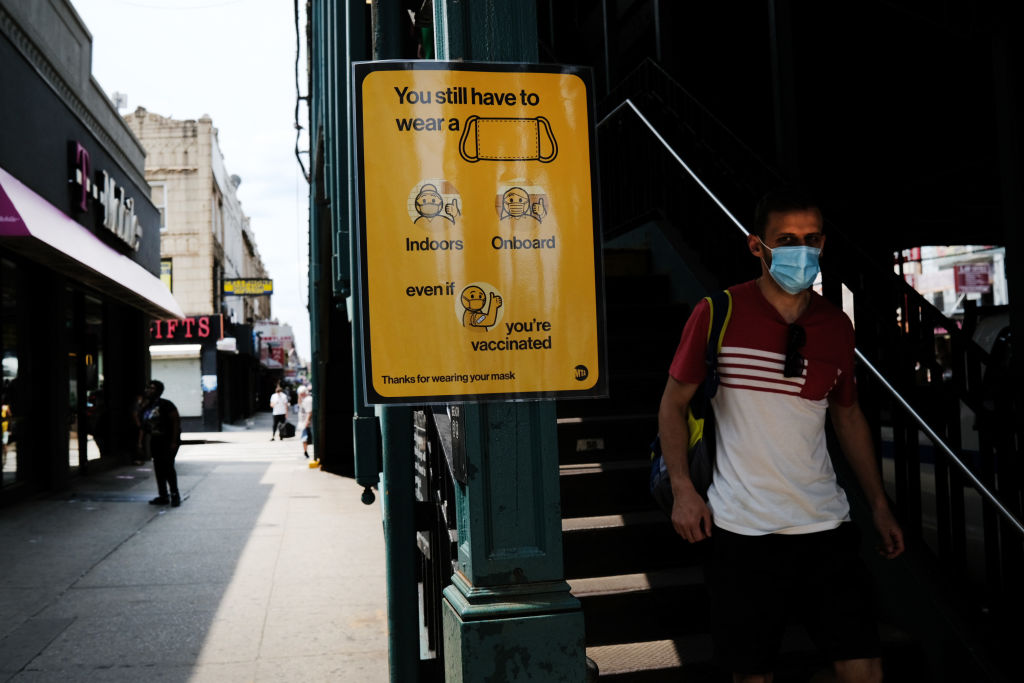CDC reportedly 'staying the course' on its mask guidance


A free daily email with the biggest news stories of the day – and the best features from TheWeek.com
You are now subscribed
Your newsletter sign-up was successful
Amid the spread of the Delta variant of COVID-19, the Centers for Disease Control and Prevention is reportedly "staying the course" on its mask guidance — for now, at least.
On Wednesday, The Washington Post reported that officials in the Biden administration are "debating whether they should urge vaccinated Americans to wear masks in more settings" due to a spike in cases caused by the Delta variant of COVID-19. But CBS News reported Thursday that, according to a source close to the discussions, there are "currently no plans to change the CDC guidance on masks ... We're staying the course." A federal health official also told CBS that the CDC isn't currently planning to update its mask guidance, saying, "unless there's some really compelling science that we don't know about yet that emerges, there's just simply no plan to change the guidance."
The CDC announced in May that vaccinated Americans mostly wouldn't be advised to wear masks anymore. Amid a spike in cases due to the Delta variant, though, there have been some calls for the guidance to be revised. Former Surgeon General Jerome Adams, for example, said this week that "instead of vax it OR mask it, the emerging data suggests CDC should be advising to vax it AND mask it in areas" where cases are high. And the Post reported that there have been discussions about asking "all Americans to wear masks when vaccinated and unvaccinated people mix at public places or indoors."
The Week
Escape your echo chamber. Get the facts behind the news, plus analysis from multiple perspectives.

Sign up for The Week's Free Newsletters
From our morning news briefing to a weekly Good News Newsletter, get the best of The Week delivered directly to your inbox.
From our morning news briefing to a weekly Good News Newsletter, get the best of The Week delivered directly to your inbox.
On Thursday, though, CDC Director Rochelle Walensky said that for vaccinated people, continuing to wear a mask to receive an "extra layer of protection" is an "individual choice." Walensky also noted, though, that "we are always looking at the data as the data come in."
A free daily email with the biggest news stories of the day – and the best features from TheWeek.com
Brendan worked as a culture writer at The Week from 2018 to 2023, covering the entertainment industry, including film reviews, television recaps, awards season, the box office, major movie franchises and Hollywood gossip. He has written about film and television for outlets including Bloody Disgusting, Showbiz Cheat Sheet, Heavy and The Celebrity Cafe.
-
 Local elections 2026: where are they and who is expected to win?
Local elections 2026: where are they and who is expected to win?The Explainer Labour is braced for heavy losses and U-turn on postponing some council elections hasn’t helped the party’s prospects
-
 6 of the world’s most accessible destinations
6 of the world’s most accessible destinationsThe Week Recommends Experience all of Berlin, Singapore and Sydney
-
 How the FCC’s ‘equal time’ rule works
How the FCC’s ‘equal time’ rule worksIn the Spotlight The law is at the heart of the Colbert-CBS conflict
-
 A Nipah virus outbreak in India has brought back Covid-era surveillance
A Nipah virus outbreak in India has brought back Covid-era surveillanceUnder the radar The disease can spread through animals and humans
-
 Trump HHS slashes advised child vaccinations
Trump HHS slashes advised child vaccinationsSpeed Read In a widely condemned move, the CDC will now recommend that children get vaccinated against 11 communicable diseases, not 17
-
 Covid-19 mRNA vaccines could help fight cancer
Covid-19 mRNA vaccines could help fight cancerUnder the radar They boost the immune system
-
 FDA OKs generic abortion pill, riling the right
FDA OKs generic abortion pill, riling the rightSpeed Read The drug in question is a generic version of mifepristone, used to carry out two-thirds of US abortions
-
 The new Stratus Covid strain – and why it’s on the rise
The new Stratus Covid strain – and why it’s on the riseThe Explainer ‘No evidence’ new variant is more dangerous or that vaccines won’t work against it, say UK health experts
-
 RFK Jr. vaccine panel advises restricting MMRV shot
RFK Jr. vaccine panel advises restricting MMRV shotSpeed Read The committee voted to restrict access to a childhood vaccine against chickenpox
-
 Texas declares end to measles outbreak
Texas declares end to measles outbreakSpeed Read The vaccine-preventable disease is still spreading in neighboring states, Mexico and Canada
-
 RFK Jr. shuts down mRNA vaccine funding at agency
RFK Jr. shuts down mRNA vaccine funding at agencySpeed Read The decision canceled or modified 22 projects, primarily for work on vaccines and therapeutics for respiratory viruses
